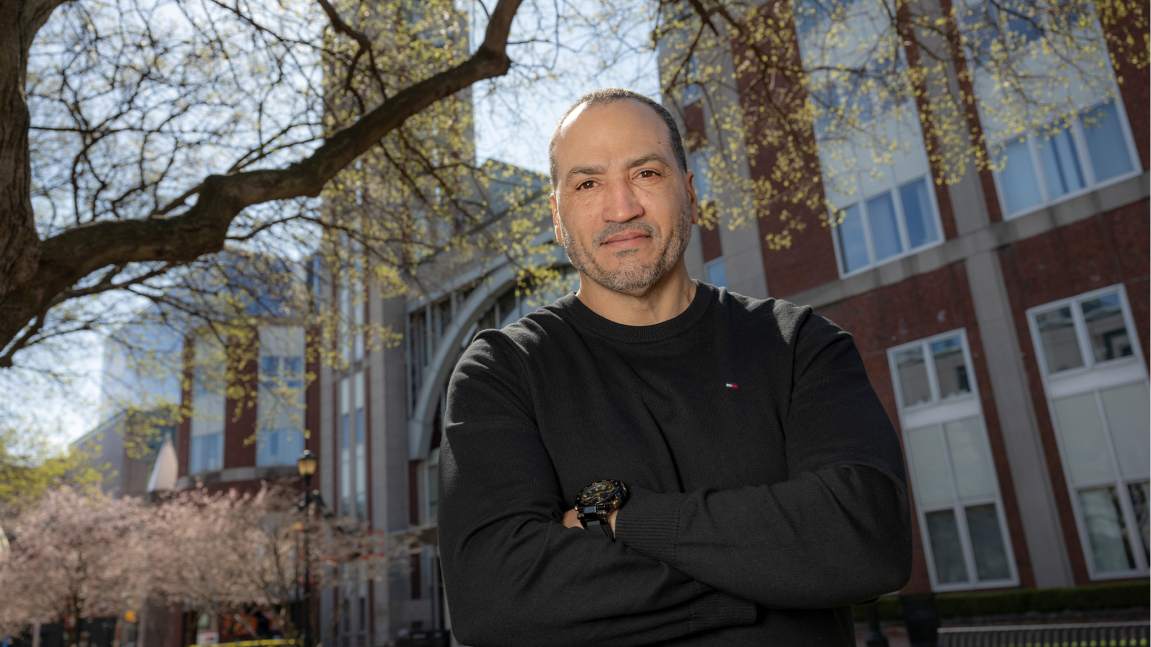NJ-STEP Alumnus Efren Mercado was recently featured in Rutgers Today for his work assisting local residents avoid eviction with Newark Community Solutions. Read full article here.

April 22, 2024
by Chris Agans
Comments Off on NJ-STEP Student Earns Degree While Building Career as Anti-Eviction Advocate
NJ-STEP Alumnus Efren Mercado was recently featured in Rutgers Today for his work assisting local residents avoid eviction with Newark Community Solutions. Read full article here.

April 12, 2024
by Chris Agans
Comments Off on NJ-STEP Undergraduate Named a 2024 Truman Scholar at Rutgers University–Camden
NJ-STEP student Paul Boyd is the first-ever student from Rutgers–Camden to be named a Truman Scholar and only the 16th student from Rutgers University since the scholarship program was created in 1975. Read the full article here.

December 22, 2023
by Chris Agans
Comments Off on NJ-STEP Student featured for work with New Jersey Small Business Development Corp.
Lavonta Bass was recently featured by Rutgers Business School for his work assisting program coordinators who are training incarcerated men and women interested in starting their own businesses when they re-enter society. He is also hoping to participate in the RU Flourishing Program run by the Rutgers Advanced Institute for the Study of Entrepreneurship and Development. Read full article here.

November 1, 2023
by Chris Agans
Comments Off on Rutgers Disability Studies Faculty Focus on ‘Special Ed to Prison Pipeline’
In partnership with NJ-STEP scholars, Rutgers-Newark experts are working to raise awareness of the link between educational disability classifications and incarceration. They call it the “special ed to prison pipeline.’’ Read full article here.

August 24, 2023
by Chris Agans
Comments Off on NJ-STEP Students Dive Into Engineering Research at Princeton University
The Princeton’s Prison Teaching Initiative (PTI) team recruit and support a cohort formerly incarcerated undergraduate research interns each summer. In addition, PTI has brought higher education classes to prisons across New Jersey since 2006, and is a founding partner of the National Science Foundation’s STEM-OPS network, which advances STEM learning opportunities for people who are currently and formerly incarcerated. Read full article here.

July 24, 2023
by Chris Agans
Comments Off on NJ-STEP Grad Works to Prevent Violence, Trauma
NJ-STEP Alumnus Sammy Quiles was recently featured at Rutgers for his restorative justice work with the City of Newark in the Office of Violence Intervention and Trauma Recovery. Read full article here.

June 21, 2023
by Chris Agans
Comments Off on How College in Prison Changes Lives
NJ-STEP Alumnus Dameon Stackhouse was featured in a recent article written by Nazish Dholakia and published by the Vera Institute. Follow the link to read the full piece: https://www.vera.org/news/how-college-in-prison-changes-lives.
March 22, 2023
by Chris Agans
Comments Off on NJ-STEP and Alumni Featured in the Chronicle of Higher Education for College Reentry Supports
From Kelly Field, “Of the 374 prison-ed programs surveyed by the Alliance for Higher Education in Prison in the 2019-20 academic year, less than one in five offered direct pathways to a campus program, and even fewer — 14 percent — provided re-entry services. Among those that did, the most common supports were admission and financial-aid counseling, a 2021 report by the Alliance showed. Fewer than 20 percent offered technology or housing support.”
NJ-STEP, along with NJ-STEP alumni Carmelo Ortiz were both recently highlighted for their reentry supports in the Chronicle of Higher Education. Read full article here.

October 24, 2022
by Chris Agans
Comments Off on NJ-STEP and the Rutgers Advanced Institute for the Study of Entrepreneurship and Development (RAISED)
The Rutgers Advanced Institute for the Study of Entrepreneurship and Development (RAISED) partners with NJ-STEP to foster urban entrepreneurship among the justice impacted population.
See more about the project here.

January 10, 2022
by Chris Agans
Comments Off on Drew Theological School Committed to Restorative Justice and Reentry Efforts Through Education
Excerpted from https://drew.edu/stories
Drew PREP, which has been offering classes in two New Jersey prisons for more than a decade, brings the Drew classroom into the prison setting with the goal of equally educating both incarcerated (“inside”) and Theological School (“outside”) students through the sharing of diverse experiences, identities, and belief systems. More than half of the Theological School faculty and more than 100 inside and outside students have studied together in Edna Mahan and Northern State correctional facilities in New Jersey.
The program, which had been paused due to the COVID-19 pandemic, is relaunching in the spring 2022 semester with a new initiative to offer the first graduate level certificate program in the state of New Jersey. The certificate will be piloted at East Jersey State Prison in Rahway, New Jersey.
Drew’s PREP certificate in religious leadership and social transformation is available to inside students, and a certificate in restorative justice and prison ministries is available to Drew Theological School master’s degree students. The program builds a theological, analytical, and practical foundation for developing religious leadership skills for social transformation.
Read the full article here

December 16, 2021
by Chris Agans
Comments Off on Drew University Extends the NJ-STEP Pipeline with Spring 2022 Launch of Master’s Level Pilot Program
Excerpted from https://www.state.nj.us/corrections, 12/8/21 press release
Drew University will be joining the consortium of degree-granting higher education institutions, which includes Rutgers University and Raritan Valley Community College, as part of the New Jersey Scholarship and Transformative Education in Prisons (NJ-STEP) initiative to provide educational services to the New Jersey incarcerated population. East Jersey State Prison in Rahway is the first institution to offer post-graduate credits.
…
“At East Jersey we have the highest number of people who have graduated from NJ-STEP, completing their associate’s and their bachelor’s degree,” said Dr. Darcella Sessomes, NJDOC Assistant Commissioner, Division of Programs and Community Services. “We are excited to launch this program at East Jersey State Prison for those individuals who wish to take the next step in their continuing educational journey.”
Officials from Drew and other colleges toured East Jersey State Prison to assess educational spaces and determine the interest in and viability of the program. “Our pilot graduate certificate program is in religious leadership and social transformation, and is open to people of all faiths or no faith tradition,” said Rev. Dr. Melanie Johnson-DeBaufre Interim Dean of Drew Theological School. “The interdisciplinary program has its roots in
theological studies and develops leadership for the common good.”
Students in the program gain experience in graduate studies earning them 15 credits and a head start to pursue a master’s degree in their field of interest.
The pilot program is scheduled to offer its first class to coincide with the 2022 spring semester.
Full NJDOC press release here.

September 8, 2021
by Chris Agans
Comments Off on ‘Beyond the Box for Higher Education Act’ Would Remove Barriers To Higher Education For Americans With Criminal Justice System Involvement
From: https://www.insidehighered.com/
Advocates say now is the time for colleges and universities to move “beyond the box” and stop asking criminal history questions on admissions applications. A Senate bill would help make that happen…
Click here for press release from Senator Schatz and full Inside Higher Ed article.
September 2, 2021
by Chris Agans
Comments Off on Residents of Middlesex Juvenile Detention Center receive education from Middlesex College
Excerpted from centraljersey.com
Middlesex College students and Middlesex Juvenile Detention Center (JDC) residents are being uplifted by an expansion of R.I.S.E – Reaching Individual Success through Education – a program serving an underserved population in the detention center.
Thanks to recent grant funding from the Middlesex College Foundation and the New Jersey Governor’s Juvenile Justice and Delinquency Prevention Committee, Middlesex College has been able to expand to even greater heights its R.I.S.E. program for JDC residents.
The program has grown from Middlesex College offering college programming to Middlesex JDC residents to having Middlesex JDC residents actually earn college credits as Middlesex College students.
Read full article here

March 14, 2021
by Eric Pereira
Comments Off on New Education Secretary Should Prioritize Implementation of Pell Grants for People in Prison
From: https://thehill.com
Newly confirmed Secretary of Education Miguel Cardona made some appealing promises during his confirmation hearing: Namely, that he would prioritize closing equity gaps and making education more attainable for all students. One of the most immediate ways he can accomplish this goal is by making sure that Pell Grant eligibility for incarcerated students is implemented as promptly as possible before the 2023 deadline. Students who are eager to make a better life for themselves and their families are relying on him to help put the ban on Pell Grants for incarcerated people in the past. Congress did its part by formally lifting the ban in late December, and it’s now up to Cardona and his staff to focus on implementation.
It’s important to understand how exactly the reversal of this 26-year-old ban will change lives. The Vera Institute of Justice, along with the Georgetown Center on Poverty and Inequality, found in a 2019 report that lifting the ban will increase employment among formerly incarcerated people by 10 percent, on average. Researchers also found that reduced recidivism rates will save states a combined $365.8 million a year as a result of fewer people returning to prison. At a time when many state and municipal budgets are squeezed due to the COVID-19 pandemic’s disastrous effect on the economy, these cost savings will be extremely critical.
It is those who have been directly impacted by the Pell ban and who courageously stepped forward to share their personal stories with others who deserve to be celebrated as the real champions of this policy win. People like Boris Franklin, who spent 11 years incarcerated in the New Jersey prison system. Boris was fortunate to have access to the state-funded NJ-STEP program, which allowed him to pursue his degree in sociology from Rutgers University while behind bars and eventually obtain a job where he continues to push for criminal justice reform at the local, state and federal levels.
By: Nick Turner is president and director of the nonprofit Vera Institute of Justice in New York, which was created in 1961 to collaborate with government, civic leaders and communities impacted by the criminal legal and immigration systems to implement change. Follow him on Twitter @NickTurner718.

March 5, 2021
by Eric Pereira
Comments Off on As Pell Grants Open Up for Incarcerated Students, Programs Ready for Growth
From: https://www.highereddive.com
The sweeping 1994 crime bill banned incarcerated people from obtaining Pell Grants. In 2015, the Obama administration launched the Second Chance Pell program, which former U.S. Secretary of Education Betsy DeVos expanded last spring.
Students earned more than 4,500 degrees and certificates through the program as of 2019, said Margaret diZerega, the director of the Vera Institute of Justice’s Center on Sentencing and Corrections. The 2020 expansion more than doubled the number of participating colleges to 130 schools across 42 states and the District of Columbia. The latest legislation significantly expands its scope. The Vera Institute has estimated that nearly half a million incarcerated people would be eligible for Pell Grants if the ban was lifted.
While that’s only about a fifth of the U.S. incarcerated population, advocates hope the change will give Second Chance Pell staying power.
The legislative expansion was a relief to Chris Agans, a Rutgers University employee who oversees the administration of New Jersey Scholarship and Transformative Education in Prisons (NJ-STEP), an association of New Jersey higher education institutions that help incarcerated people access college classes.
Through NJ-STEP, students earn degrees from Rutgers or Raritan Valley Community College, which are among the department’s experimental sites for Second Chance Pell. Other universities contribute courses or faculty. NJ-STEP was founded in 2012 and initially used private and university funding to help people in prison afford and access education. Since then, Agans said, more than 250 students have earned associate degrees and 48 have earned bachelor’s while incarcerated. More than 100 earned a bachelor’s after their release and 16 went on to earn a master’s degree.
“The permanency of Second Chance Pell is a tremendous boon to existing programs who have been living in this year-to-year attempt at creating budgets,” he said, noting that it can allow for investments in infrastructure that could make these programs feel more connected to their schools.
Even with more federal support, there are significant hurdles to increasing college access among incarcerated students. Some of these were pointed out in a 2019 Congressional report evaluating a potential expansion, which also bemoaned the “little research on the best way to deliver postsecondary education in prisons.”
For one, only about two-thirds of incarcerated people have a high school diploma or its equivalent, the Vera Institute notes, a prerequisite for college classes. Even then, correctional systems and facilities may have additional rules. In New Jersey, for instance, students in solitary confinement can’t participate, Agans said.
Other factors that could disqualify potential students include having previously defaulted on student loans and being unable to gather the necessary documentation to apply for financial aid.
The correctional facilities themselves are often a barrier. “Pretty much every room in the prison is the wrong space,” Agans said. “They’re built for security.”
Modern colleges assume students can be self-directed — logging into their school emails, connecting with advisers, and mastering the library and assignment submissions systems. In prison, Agans said, students often can only use notepads, and getting their work into the school’s computer system can take hours and introduce human error.
Agans said running these programs can get expensive, and he keeps his budget in line by keeping costs down and recycling materials. Some programs, he said, have figured out how to make money by compromising quality, using distance learning or relying on volunteers. But, he added, “it seems the overwhelming majority of directors I talk to are in the hole.”
By Joy Resmovits

November 30, 2020
by Eric Pereira
Comments Off on It’s Time to Finally Give Incarcerated People Access to Pell Grants
From: https://www.washingtonpost.com
As the presidents of Claflin University and Langston University, two distinguished historically Black universities in America, we have seen firsthand how education provides a gateway to empowerment. As HBCUs, our schools share the core value of providing an education that fosters mutual respect, diversity and inclusion. But we can and should be doing more to include incarcerated students into that vision. To do that, Congress must lift the ban on federal Pell grants for people in prison.
Earlier this year, Claflin University was selected to participate in the U.S. Education Department’s Second Chance Pell Experimental Sites Initiative, joining Langton University and 128 other colleges and universities that offer educational opportunities for incarcerated students. The program, which allows these students to apply for crucial federal financial aid for these schools, has proved that corrections facilities and colleges can sustain large postsecondary education programs together if given the chance. But even as our universities commit to Second Chance Pell, we are calling on lawmakers to permanently lift the federal ban on Pell grants for all incarcerated people.
The mission and vision of HBCUs provide a unique educational space for all students — no matter if they take classes on campus, online or from inside prison facilities. If the Pell ban is lifted, more HBCUs would have a path forward to teach in prisons. Consider that even though Black men and women make up 13 percent of the U.S. population, they comprise more than a third of people in the criminal justice system. The Pell ban denies this disproportionately Black population the ability to secure the income, safety and opportunities necessary to transform their lives and their families’ futures. We in the HBCU community cannot stand by and allow this inequity to persist.
Earning a quality education plays a critical role in the successful reentry of formerly incarcerated people into their communities. Nationwide, more than 95 percent of people in prison will eventually be released, but more than a third will return to prison within three years. However, incarcerated people with access to education and skills training are about 48 percent less likely to return to prison than those without. When we empower incarcerated people to start down a meaningful career path upon returning to the community, the cycle of poverty and involvement in the criminal justice system is positively disrupted.
Education produces better outcomes for all: incarcerated people, their families and loved ones, the prisons in which they reside, and the communities to which they return. Incarcerated parents who enroll in college programs share their knowledge, skills and connections — their social capital — with their children and families, multiplying the impact of a single college degree. This is particularly important for people of color who have been largely excluded from wealth-building policies in the past. The result is a nation in which White Americans have 20 times the net worth of Black Americans, 35 percent of whom have negative or zero net worth.
Opinion by Dwaun J. Warmack and Kent J. Smith Jr.
Dwaun J. Warmack is president of Claflin University and a 2019 Eisenhower fellow. Kent J. Smith Jr. is president of Langston University and former chair of the Association of Public and Land-grant Universities Council of 1890 Universities.

November 18, 2020
by Eric Pereira
Comments Off on NJ-STEP Partner, Raritan Valley Community College’s RISE Program Highlighted in Community College Daily
From: https://www.ccdaily.com
Providing postsecondary education to incarcerated individuals can ensure former inmates will have an opportunity to a successful life when they are released. But setting up an education system inside prison walls – where there are major security considerations – calls for a whole new set of policies and procedures, according to the Vera Institute of Justice.
“Because postsecondary education in prison combines two very different worlds, bureaucracies and sets of policies and practices, colleges and corrections agencies new to this field will find that melding these two systems takes time, patience, creativity and tenacity,” says a new report by the Vera Institute that offers step-by-step guidance for starting a postsecondary education program for prisoners.
“Any college should be aware it does take an effort” to launch a prison education program, says Sheila Meiman, director of Returning and Incarcerated Student Education (RISE) at Raritan Valley Community College (RVCC) in New Jersey. RVCC had to add staff to handle the increased administrative requirements to participate in the federal Second Chance Pell program.
The college educates about 500 inmates a semester at seven state prisons. During the COVID-19 pandemic, however, participation has dropped by about half, as some inmates aren’t comfortable with distance learning or are in quarantine.

September 28, 2020
by Eric Pereira
Comments Off on Why Liberal Arts Education for Currently Incarcerated People is a Sound Investment
From: https://www.usatoday.com
We should look to the humanities to help prisoners prepare for the business of living.
What reaction does the term “prison education” evoke?
For many, the immediate thought is vocational training with the goal of teaching inmates practical skills that theoretically provide connections to work in the “real world” after release.
This fits perfectly with the American mindset about education and work generally: the only truly valuable education is one that connects the student directly to employment. Everything else is a luxury at best, or a waste of time and money at worst.
But for all the supposed realism and pragmatism of this view, for many behind bars, it may be the least practical and effective approach from the standpoint of supporting rehabilitation and reducing recidivism.
Comparatively few people have the actual gifts and interests necessary for success in skilled trades. Moreover, it is arguable that technical education doesn’t actually address the functional illiteracy (a lack of basic reading, writing and other communication skills) and socialization challenges including impaired “theory of mind” (the ability to empathize with other people in a positive and meaningful way) that help pave the way to crime and imprisonment.
The singular focus on technical education also fails to acknowledge that life in prison often reinforces and exacerbates early-life traumas and behavioral deficits that help create the cycle of anti-social behavior, criminal activity and incarceration.
Albert Einstein noted that “the value of an education in a liberal arts college is not the learning of many facts but the training of the mind to think something that cannot be learned from textbooks.” All people can benefit from training their minds to think broadly and deeply about the world and their place in it, perhaps especially those who have committed crimes and been incarcerated.
While people must pay penalties for criminal activity, including spending time prison when necessary, we can also find ways of using education to redeem both the time and the person behind bars.
Brent Orrell is a resident fellow at the American Enterprise Institute

September 1, 2020
by Eric Pereira
Comments Off on We Already Have a Tool That Lowers Crime, Saves Money and Shrinks the Prison Population
From: https://www.politico.com
Dyjuan Tatro grew up in a poor neighborhood in Albany, N.Y., where gunshots were common and education inaccessible. Around 10th grade, Dyjuan dropped out and was selling drugs. A few years later, when he was 20, he was involved in a shooting and sentenced to prison for assault.
Thankfully, that was just the first chapter of Dyjuan’s story. While incarcerated, Dyjuan was able to access the education he had missed as a teenager. He was accepted to the Bard Prison Initiative’s postsecondary education program, where he joined BPI’s debate team — which drew national attention after defeating Harvard University. By the time Dyjuan got out of prison, he had finished a mathematics major and earned a bachelor’s degree from Bard College. Today, he works as a government affairs and advancement officer for BPI.
In America, individuals released from prison often return to crime. One study published in 2018, which analyzed data from 23 states, found that 37 percent of those released in 2012 returned to prison within three years. Of those released in 2010, 46 percent returned to prison within five years.
But the recidivism rate is far lower for prisoners who are able to get some postsecondary education while in prison. Fewer than 3 percent of graduates of BPI, which is based in New York, return to prison. In contrast, well over 30 percent of individuals released from the New York Department of Corrections and Community Supervision return to custody within just three years. Other colleges with similar postsecondary education programs for prisoners also boast lower recidivism statistics than their state averages.
Providing education to the incarcerated is a win-win — it reduces future crime rates and saves public funds that otherwise would be spent keeping people in jail or prison.
Unfortunately, however, Dyjuan’s ability to access a postsecondary education while incarcerated is far from typical. The 1994 Violent Crime Control and Law Enforcement Act rendered anyone behind bars ineligible to receive federal Pell Grants. These grants, which give impoverished students financial aid for postsecondary education, had long been a critical funding mechanism for in-prison college programs. The Pell Grant ban put a virtual end to postsecondary education for prisoners who weren’t able to take advantage of privately funded programs like Bard’s or who didn’t have greater familial financial support.
By EMILY MOONEY

August 10, 2020
by Eric Pereira
Comments Off on Mountainview Alum Renaldo Chavis: Using Education to Transform and Empower
From: https://www.newark.rutgers.edu/
Renaldo Chavis embodies the transformative power of education at Rutgers University-Newark (RU-N) and how it can help reshape one’s future. The Newark native’s early roots began at Irvington High School in New Jersey. There, he was removed and placed at an alternative high school in East Orange before being incarcerated for almost 20 years.
“I was never into education. I dropped out of school and got my GED in prison,” Chavis said. “When I was first reintroduced to education in 2013, I was much older and developed as a young man. The more I began to embrace it, the more I appreciated education. Sociology, psychology, and political science were among my initial interests.”
Chavis was able to receive an education while incarcerated through the New Jersey Scholarship and Transformative Education in Prisons (NJSTEP) initiative. The program based at RU-N consists of higher education institutions in New Jersey which provide higher education courses toward a college degree for students while they are incarcerated and assist in their transition to college life upon release from prison through the guidance of the Mountainview Communities.
“Go to class, conduct yourself the way you are supposed to, and the universe starts to work in your favor. For me, it worked out so much so that I was able to get an opportunity. [NJSTEP] worked!” Chavis exclaimed.
The Newark Public Safety Coalition (NPSC) offered Chavis his first job after being incarcerated as a research assistant. Before Chavis received this opportunity, his past work experiences included being a licensed cosmetologist and working at a neighborhood barbershop with his brothers, while doing other entrepreneurial work on the side.
Chavis explained, “I was able to get a good job going to school doing what I’m supposed to do, such as consistently staying on the dean’s list, meaningful networking, and accepting the process. The professors recognize between the people who are just there and the people who are making the concerted effort to learn and participate in their respective disciplines. I wanted to do more than just pass. I was there to learn.”
Chavis received his bachelor’s degree in political science from the School of Arts and Sciences-Newark (SASN.) His future goals include continuing with his current job and starting his own business in the international trade field. Despite the obstacles that Chavis encountered in his early life, he says the motivation, resilience, and network that he gained during his time at Rutgers-Newark through NJSTEP, will guide him throughout the rest of his life.
“I don’t sweat what I don’t have. I appreciate the things I do have. I saw the process with several others in my cohort, most of whom had life in prison, and I was one of those who made it out. I am not just representing myself. I’m representing them and the NJ STEP program. I’m doing it for more than just me,” Chavis said.
By CHRISTOPHER ROJAS
From: https://fredericksburg.com
The NJ-STEP community mourns the loss of philanthropist Doris Buffett. As an early supporter of college in prison in New Jersey, Doris’s vision and her foundation’s contributions made our current work possible. Her positive impact on our families and communities will continue well into the future.
From: https://www.insidehighered.com
With limited technology in their facilities, most college-in-prison programs moved to paper correspondence amid the pandemic. Others were suspended altogether.
The benefits of college programs in prisons are well documented. Research shows that postsecondary programs can reduce recidivism while improving morale and safety in facilities and increasing post-incarceration job prospects. Support for prison education has grown in recent years, as has support for allowing inmates to access federal financial aid, which was banned in 1994.
But just as colleges and universities had to drastically adjust their instruction when the coronavirus pandemic exploded in March, so too did higher education programs in prisons.
Prisons have been, along with nursing homes and meatpacking plants, hit incredibly hard by COVID-19. Limited space and disinfectant made the disease spread widely in facilities with insufficient health care and a high prevalence of underlying conditions. There have been nearly 44,000 cases among inmates in state and federal prisons, likely an undercount since testing has been limited inside facilities. Though local jails have been releasing some detainees to reduce overcrowding and mitigate the spread of disease, prisons have released far fewer people.
The college programs housed in prisons have now, for the most part, gone one of three paths. Some have switched to a paper correspondence model, while others have tried to leverage any existing technology in their facility. Many have suspended their programs altogether.
Technological Constraints
“The departments of corrections that had gotten farther into offering technology, offering controlled internet, and had gotten some level of comfort with that over the years, those are the places that adapted most quickly to this situation,” said Delaney, a program manager at the Vera Institute for Justice, which assists colleges and corrections agencies with expanding postsecondary education.
Research has shown that black and Hispanic students have unequal access to quality education, at schools with few resources and little funding. Black and Hispanic students are less likely than their white peers to enroll in a four-year college or to graduate once enrolled. Black and Hispanic graduates are more likely to have attended institutions with less money or resources.
With COVID-19 now spiking in several states and outbreaks ongoing in prisons, the future of higher education in prison is still filled with uncertainty.
By Lilah Burke
From: https://www.themarshallproject.org
When coronavirus kept college professors from teaching in person at Maine Correctional Facility, officials reconfigured a prison classroom to hold classes over Zoom using the Internet from an administrator’s computer. Officials at Saginaw Correctional Facility in Michigan waived a ban on communication between volunteers and prisoners so that Delta College professors could instruct their students over email. At Great Meadow Correctional Facility in New York, college classes are postponed and graduation is cancelled.
Coronavirus has upended the semester for college students across the country—and thousands of incarcerated students are no exception. On the outside, professors are conducting classes over video conferencing and graduations will be live-streamed online. But in prison, where the majority of incarcerated people are cut off from the Internet, the options for distance learning are limited, leaving college administrators scrambling to figure out how to finish the semester from beyond the prison walls. Many have found workarounds now that they can no longer enter the prisons. But they fear the coronavirus could undermine a critical component of college in prison: teaching in person.
Research shows that higher education in prison reduces recidivism and saves taxpayer money. In interviews with The Marshall Project college-in-prison administrators noted less often-cited benefits: College programs in prison build community, boost morale and provide incarcerated students with an antidote to the despair and monotony of prison life.
For Pablo Negron, who is enrolled at Prison-to-College Pipeline at Otisville Correctional Facility, college classes keep him “busy and away from prison politics and negativity.” Taking classes has given him a “sense of accomplishment,” which makes him feel like his time behind bars wasn’t simply wasted. As he looks forward to life after prison, he says he is optimistic he’ll have more career choices with a college education.
How well college programs are able to adapt during the pandemic largely depends on their relationship with the corrections department for their state, and what resources they’re able to provide. Many prisons are operating with a reduced workforce, and can’t spare the staff to keep the college programs running. But there’s an understanding among prison officials of the value of education programs, especially during a crisis, says Ruth Delaney, who provides assistance to college sites for the Vera Institute of Justice.
“Tensions are high,” Delaney said. “Being able to give people something familiar, and engaging can really help to make sure all the resources are focused on fighting coronavirus.”
By Nicole Lewis
Nicole Lewis is a staff writer reporting on voting rights, technology and the privatization of services in prisons and jails. She previously wrote for The Fact Checker at The Washington Post. In 2016, she won an Education Writers Association award as part of a series on school desegregation in Mississippi.

April 15, 2020
by Eric Pereira
Comments Off on RU-N Chancellor Highlights Prison Ed in Call for Equality Based Pandemic Response
From: https://www.njspotlight.com
Higher education — like every sector of our economy — is hurting badly because of the COVID-19 pandemic. But the current crisis has served to throw into sharp relief structural inequities that we have allowed to exist for too long in our state and our nation despite the best of our knowledge. Racial inequity, in particular, has been hurting us badly for generations, and at universities like ours we see students as they walk the uneven path toward social mobility.
So these are hardly revelations, especially to us in New Jersey, where we have seen COVID-19’s disparate impacts progress up close as a hot spot of the pandemic and a landscape defined not only by our closeness to the epicenter in New York City, but by the density of our own demographic diversity divided vastly unevenly across urban-suburban-rural geographies. Initially, there was some recognition that when schools closed, students who qualify for free and reduced lunch, disproportionately represented in black, brown, undocumented and/or low-income districts, might lose their breakfast and lunch and that separating students with disabilities and those more generally behind the digital divide might substantially impact learning and academic progress. In New Jersey’s densely populated urban hot spots, concerns then surfaced about residents’ ability to pay rent when their jobs were deemed nonessential, and the stability of local homeowners who rent rooms and apartments to meet their mortgages. Attention finally turned to the disparately black and brown prison population, and their increased vulnerability in crowded cells. Eventually, it got directly to matters of life and death, as the stark reality of increased co-morbidity, pervasive and multigenerational lack of access to personal health care and inadequately supplied hospitals translated, day after day, into disparities in death rates by race, class, and community.
Will we act on what we know now to buffer the disparate impact of the next equivalent assault on our communities? Or, will we instead turn our backs on building stronger safety nets because “others” (and we know who they are) might be lifted up, even when such investments would ultimately benefit all of us; for example, as the next more diverse generation supports the aging, majority-white baby boom generation?
Trillions and trillions of dollars will be spent in the coming months to shore up our broken economy. The first few hundred million is making its way to New Jersey right now to shore up higher education alone. But make no mistake: that will only address — and only in part — the symptoms of what ails us. Considering what we know — seen clearly through a racial-equity lens — will we use the accumulated knowledge of our institutions that anchor our communities, and of our citizenry, to actually do something about it … together?
By Nancy Cantor and Peter Englot
Nancy Cantor is chancellor of Rutgers University – Newark.
Peter Englot is senior vice chancellor for public affairs and chief of staff at Rutgers University – Newark.

January 17, 2020
by Eric Pereira
Comments Off on NJ-STEP Alum started his college education behind bars. Now he wants to help kids avoid prison.
From: https://www.cbsnews.com/
Dameon Stackhouse was several years into his prison sentence when he learned he would have a shot at earning his college degree. He was 37 years old and sitting inside East Jersey State Prison.
“You hear things, and over time, you’re just disappointed so many times,” Stackhouse told CBS News. “But I’m optimistic, so whenever something is presented to me, I jump clean on it whether it’s real or not.”
Despite his initial skepticism, the opportunity turned out to be very real. It was 2013, the first year of an initiative known as New Jersey Scholarship and Transformative Education in Prison, or NJ-STEP.
“When you educate individuals on how to be better and productive citizens, you don’t have to keep reinvesting in that,” Stackhouse said when asked about criticism of tax dollars paying for an inmate’s education.
“That investment turns over,” he added. “You work with the community. It stops our kids from going to the youth correctional facilities.”
Stackhouse currently participates in a diversion initiative to help juveniles stay out of the criminal justice system he spent over a decade in himself. He said the ultimate goal is to open up a youth center of his own.
During Stackhouse’s early days at Rutgers, one professor, in particular, took an interest in his success.
“The students we get are very young, in their late teens, early 20s,” said Elizabeth Torres, an associate professor of psychology. “[Stackhouse] was very soft-spoken. Something about his demeanor is very calming. That’s what I remember the most.”
Now Stackhouse works in Torres’ lab. There he helps conduct experiments for leading autism research. She has pledged to help him find funding to reach his next goal: a Ph.D. in psychology.
East Jersey State Prison houses the most NJ-STEP participants in the state. Hicks said success stories like Stackhouse’s are vital to the growth of the program.
“The typical offender in this facility is here for a longer sentence,” Hicks added. “They’re hungry, they have time to devote to their studies. They see the other successful students have had with their education and word is spreading around.”
Stackhouse not only serves as a role model for those waiting to be released but for the kids he volunteers with. It’s a position he doesn’t take lightly. He says he’s always working toward the goal of his own youth center one day in Trenton.
“I’ve always been a therapist, I’ve just never had the education before,” he said. “Even when I was incarcerated, everybody came to me with issues. I have my own issues, but I can listen. Sometimes people just need to talk it out. I’ve been doing that my whole life.”
By Tyler Kendall
Tyler is a content producer for CBSN. She also covers criminal justice reform. Reach her at: tyler@cbsnews.com.
January 10, 2020
by Chris Agans
Comments Off on New Bill Permits NJ State Education Grants in Prison College Programs

December 21, 2019
by Chris Agans
Comments Off on Incarcerated graduates say degrees help them “transcend” prison’s walls
Courtesy of Tyler Kendall, cbsnews.com
“Lavonta Bass’ khaki-colored prison uniform peeks out from beneath his cap and gown. Honor cords are draped around the 42-year-old’s neck. He has spent over a decade in prison but says he was fine delaying an early release if it meant his son could see him graduate as valedictorian.
“I think it was a symbolic moment for him,” Bass told CBS News. “For me to really show him that although I’m here, I’m still trying to do things to better myself.”
CBS News gained exclusive access to East Jersey State Prison for a graduation ceremony in November. Bass was one of 56 incarcerated students who earned a degree — an associate’s from Raritan Valley Community College or a bachelor’s from Rutgers University. “
Read the full story here.

September 23, 2019
by Eric Pereira
Comments Off on Princeton Prison Teaching Initiative awarded NSF grant to promote STEM careers
From: https://www.princeton.edu/
The Prison Teaching Initiative (PTI) at Princeton University is one of five organizations awarded a collaborative National Science Foundation grant to build a national alliance that will forge robust pathways to STEM (science, technology, engineering and mathematics) careers for people who are, or were, incarcerated.
PTI is made up of volunteers from around Princeton University who teach accredited college courses in New Jersey state prisons with Raritan Valley Community College and Rutgers University as part of the NJ-STEP Consortium, and in the Ft. Dix Federal Correctional Institution in partnership with Mercer County Community College. Co-founded PTI in 2005 by Gillian Knapp, now an emeritus professor of astrophysical sciences, and former postdoctoral fellow Mark Krumholz, Class of 1998, today PTI is an initiative offered through Princeton’s McGraw Center for Teaching and Learning.
“We are particularly excited to be part of a large-scale education equity project with leaders who were previously incarcerated,” said Jill Stockwell, administrative director of PTI, “and to propagate our model of summer research internships for formerly incarcerated undergraduates on campuses throughout the nation.”
STEM-OPS has the following four main areas of focus:
STEM-OPS will also advance knowledge of how to provide incarcerated youth with pathways to STEM education and careers.
“I’m a formerly incarcerated person with three felony convictions, sentenced to 10 years in prison,”
said Stanley Andrisse, director and founder of From Prison Cells to PhD. “I was once told by a prosecuting attorney that I had no hope for change. I am now an endocrinologist scientist and assistant professor at Johns Hopkins Medicine and Howard University College of Medicine. This prosecutor’s prophesy was a little off. It’s imperative that we offer second chances. We are missing out on talent.”
By Prison Teaching Initiative, Princeton University